I'm using a PHP script to generate an excel CSV file from a result-set query. All works fine but when I read my excel file, I can not display leading zeros.
This is my code:
$rows = $this->Query($sql);
$filename = "/www/zendsvr/htdocs/Project/public/report.xls";
$realPath = realpath( $filename );
$filename = realpath( $filename );
$handle = fopen( $filename, "w" );
$finalData = array();
for( $i = 0; $i < count( $rows ); $i++ ) {
$finalData[] = array( utf8_decode( $rows[$i]->CODE ) );
}
foreach ( $finalData AS $finalRow ) {
fputcsv( $handle, $finalRow, "\t" );
}
fclose( $handle );
If I make a var_dump() of $finalData[] I see the correct value, for example '000198', '000199', '000200' but the same value in my XLS file is 198,199,200
How can I also display leading zeros in the XLS file?
